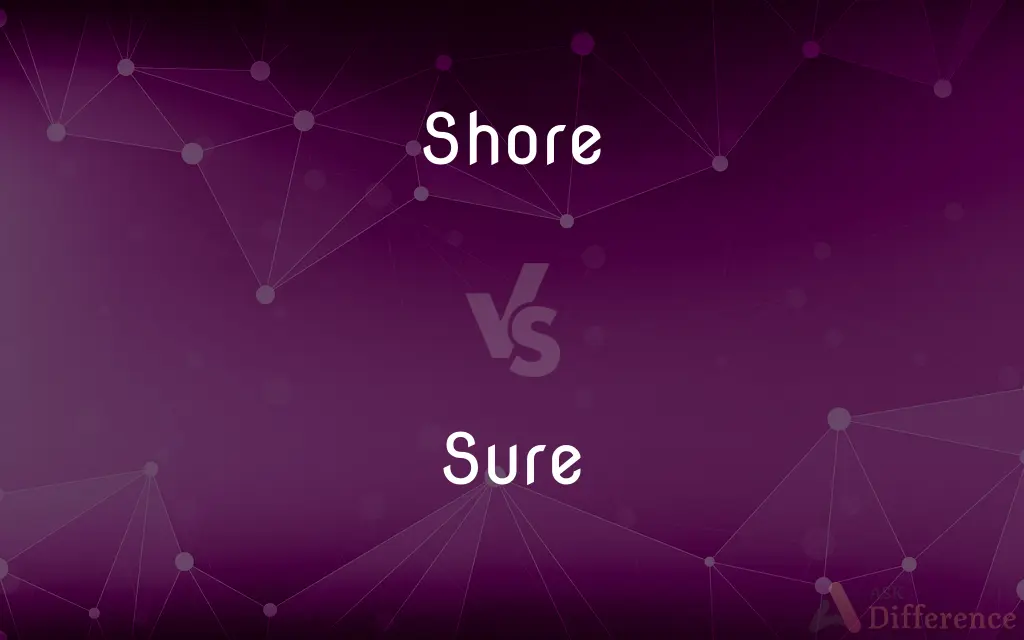Shore vs. Sure — What's the Difference?
Edited by Tayyaba Rehman — By Maham Liaqat — Updated on March 22, 2024
"Shore" refers to the land along the edge of a sea, lake, or river, while "sure" is an adjective meaning confident or certain.

Difference Between Shore and Sure
Table of Contents
ADVERTISEMENT
Key Differences
Shore is used to describe the boundary between land and water, providing a physical space that people might visit for recreation or work, like beach shores for relaxation or dock shores for fishing. In contrast, sure is often used to express assurance or conviction in one's beliefs, actions, or the reliability of something or someone. For example, you might be sure about an answer to a question, indicating no doubt in your response.
The term "shore" can also be used metaphorically to represent a place of safety or refuge, similar to reaching the "shore" after a tumultuous journey. On the other hand, "sure" can be used in various contexts to express agreement, as in "Sure, I'll help you," or to emphasize the reliability of a statement, such as "I'm sure he will come."
Shores can vary greatly in their characteristics, from sandy beaches to rocky coastlines, and their description often invokes specific imagery related to the natural world. Conversely, the use of "sure" is more abstract, relating to the concept of certainty and confidence in intangible terms, like thoughts and feelings.
In literature and speech, "shore" can evoke vivid descriptions of landscapes and settings, often used to set a scene or create a mood. "Sure," however, is more commonly found in dialogue or internal monologues, reflecting a character's or individual's level of confidence and certainty.
Comparison Chart
Definition
The land along the edge of a sea, lake, or river
Confident or certain
ADVERTISEMENT
Usage
Describes physical locations
Expresses assurance or conviction
Context
Often used in relation to bodies of water
Used in a variety of contexts to indicate confidence or agreement
Metaphorical Use
Can represent safety or refuge
Used to emphasize reliability or agreement
Association
Related to natural landscapes
Related to thoughts, feelings, and intangible concepts
Compare with Definitions
Shore
The land along the edge of a sea, lake, or river.
The children played on the sandy shore of the lake.
Sure
Confident in what one thinks or knows; having no doubt.
She was sure of her answer to the complex math problem.
Shore
A place of safety or refuge.
After the storm, the sailors longed for the shore.
Sure
Can indicate inevitability or certainty.
It's sure to rain later with those clouds.
Shore
Can be part of idiomatic expressions.
From shore to shore means across an entire country or land.
Sure
Used to express agreement or willingness.
Sure, I'd love to join you for dinner.
Shore
Used to describe specific types of coastlines.
The rocky shores of Maine are renowned for their rugged beauty.
Sure
To emphasize the reliability of a statement or action.
I'm sure he'll arrive on time for the meeting.
Shore
Invokes imagery related to the natural world.
Paintings of the shore often capture the serene interface between land and water.
Sure
Reflects a state of mind or attitude.
His sure demeanor impressed the interviewers.
Shore
The land along the edge of an ocean, sea, lake, or river; a coast.
Sure
Confident, as of something awaited or expected
I am sure we will win the game.
Shore
A shore or a shoreline is the fringe of land at the edge of a large body of water, such as an ocean, sea, or lake. In physical oceanography, a shore is the wider fringe that is geologically modified by the action of the body of water past and present, while the beach is at the edge of the shore, representing the intertidal zone where there is one.
Sure
Impossible to doubt or dispute; certain
We have sure proof of his innocence.
Shore
Often shores Land; country
Far from our native shores.
Sure
Bound to come about or happen; inevitable
A sure victory for the team.
Shore
Land as opposed to water
A sailor with an assignment on shore.
Sure
Having one's course directed; destined or bound
She is sure to succeed.
Shore
A beam or timber propped against a structure to provide support.
Sure
Certain not to miss, slip, or err; steady
A sure grip on the suitcase.
Shore
To support by or as if by a prop
Shored up the sagging floors.
Shored up the peace initiative.
Sure
Not hesitating or wavering; firm
Sure convictions.
Shore
A past tense of shear.
Sure
Worthy of being trusted or depended on; reliable
A sure friend.
Shore
Land adjoining a non-flowing body of water, such as an ocean, lake or pond.
Sure
Free from or marked by freedom from doubt
She is sure of her friends.
Shore
(from the perspective of one on a body of water) Land, usually near a port.
The seamen were serving on shore instead of in ships.
The passengers signed up for shore tours.
Sure
Careful to do something
Be sure to turn off the stove.
Shore
A prop or strut supporting some structure or weight above it.
The shores stayed upright during the earthquake.
Sure
(Obsolete) Free from harm or danger; safe.
Shore
(obsolete) To set on shore.
Sure
Surely; certainly.
Shore
Not followed by up: to provide (something) with support.
Sure
Physically secure and certain, non-failing, reliable.
This investment is a sure thing.
The bailiff had a sure grip on the prisoner's arm.
Shore
Usually followed by up: to reinforce (something at risk of failure).
My family shored me up after I failed the GED.
The workers were shoring up the dock after part of it fell into the water.
Sure
Certain in one's knowledge or belief.
She is sure of herself.
He is sure she was lying.
He was sure of being a finalist.
They aren't completely sure who will attend.
You seemed sure that the car was his.
Shore
To threaten or warn (someone).
Sure
(followed by a to infinitive) Certain to act or be a specified way.
Be sure to lock the door when you leave.
Shore
To offer (someone).
Sure
(obsolete) Free from danger; safe; secure.
Shore
A sewer.
Sure
(obsolete) Betrothed; engaged to marry.
Shore
A prop, as a timber, placed as a brace or support against the side of a building or other structure; a prop placed beneath anything, as a beam, to prevent it from sinking or sagging.
Sure
(archaic) Without fail, surely.
Shore
The coast or land adjacent to a large body of water, as an ocean, lake, or large river.
Michael Cassio,Lieutenant to the warlike Moor Othello,Is come shore.
The fruitful shore of muddy Nile.
Sure
Yes, expressing noncommittal agreement or consent.
"Do you want me to put this in the garage?" "Sure, go ahead."
Shore
To support by a shore or shores; to prop; - usually with up; as, to shore up a building.
Sure
Yes; of course.
"Could you tell me where the washrooms are?" "Sure, they're in the corner over there."
Shore
To set on shore.
Sure
You're welcome; polite response to being thanked.
"Thanks for helping me with that electrical fault." "Sure. Any time."
Shore
The land along the edge of a body of water
Sure
Certainly knowing and believing; confident beyond doubt; implicity trusting; unquestioning; positive.
We are sure that the judgment of God is according to truth against them which commit such things.
I'm sure care 's an enemy of life.
Shore
A beam or timber that is propped against a structure to provide support
Sure
Certain to find or retain; as, to be sure of game; to be sure of success; to be sure of life or health.
Shore
Serve as a shore to;
The river was shored by trees
Sure
Fit or worthy to be depended on; certain not to fail or disappoint expectation; unfailing; strong; permanent; enduring.
The Lord will certainly make my lord a sure house; because my lord fighteth the battles of the Lord.
The testimony of the Lord is sure.
Which put in good sure leather sacks.
Shore
Arrive on shore;
The ship landed in Pearl Harbor
Sure
Betrothed; engaged to marry.
The king was sure to Dame Elizabeth Lucy, and her husband before God.
I presume . . . that you had been sure as fast as faith could bind you, man and wife.
Shore
Support by placing against something solid or rigid;
Shore and buttress an old building
Sure
Free from danger; safe; secure.
Fear not; the forest is not three leagues off;If we recover that we are sure enough.
She that's made sure to him she loves not well.
Sure
In a sure manner; safely; certainly.
'T is pleasant, sure, to see one's name in print.
Sure
Having or feeling no doubt or uncertainty; confident and assured;
Felt certain of success
Was sure (or certain) she had seen it
Was very sure in his beliefs
Sure of her friends
Sure
Exercising or taking care great enough to bring assurance;
Be certain to disconnect the iron when you are through
Be sure to lock the doors
Sure
Physically secure or dependable;
A sure footing
Was on sure ground
Sure
Capable of being depended on;
A quick and certain remedy
A sure way to distinguish the two
Wood dust is a sure sign of termites
Sure
(of persons) worthy of trust or confidence;
A sure (or trusted) friend
Sure
Infallible or unfailing;
A sure (or true) sign of one's commitment
Sure
Certain not to fail;
A sure hand on the throttle
Sure
Impossible to doubt or dispute;
Indisputable (or sure) proof
Common Curiosities
Are there different types of shores?
Yes, there are various types of shores, including sandy shores, rocky shores, and muddy shores, each with distinct characteristics.
What does "shore up" mean?
"Shore up" is an idiomatic expression meaning to support or strengthen something, often used in both physical and metaphorical contexts.
How is "sure" used in questions?
In questions, "sure" is often used to seek confirmation, as in "Are you sure you locked the door?"
Can "sure" be used sarcastically?
Yes, "sure" can be used sarcastically to imply doubt or disbelief in what is being agreed to or stated.
Is "for sure" a proper expression?
"For sure" is an informal expression commonly used to strongly agree with something or confirm its certainty.
How can I remember the difference between "shore" and "sure"?
Remember that "shore" is related to the physical edge of a body of water, while "sure" is about being certain or confident.
Is it correct to say "shore of a river"?
Yes, it's correct to refer to the land along a river's edge as the "shore of a river."
Does "sure" always imply 100% certainty?
While "sure" implies a high level of certainty, it does not always mean 100% certainty, especially in casual conversation.
Can "shore" be used in a non-literal sense?
Yes, "shore" can be used metaphorically to represent a goal, safety, or a place of comfort, as in "reaching the shore" after overcoming difficulties.
Can "shore" refer to the edge of any body of water?
Yes, "shore" can refer to the edge of seas, lakes, rivers, and sometimes even large ponds.
Share Your Discovery

Previous Comparison
Emplore vs. Implore
Next Comparison
Same vs. EqualAuthor Spotlight
Written by
Maham LiaqatEdited by
Tayyaba RehmanTayyaba Rehman is a distinguished writer, currently serving as a primary contributor to askdifference.com. As a researcher in semantics and etymology, Tayyaba's passion for the complexity of languages and their distinctions has found a perfect home on the platform. Tayyaba delves into the intricacies of language, distinguishing between commonly confused words and phrases, thereby providing clarity for readers worldwide.














































